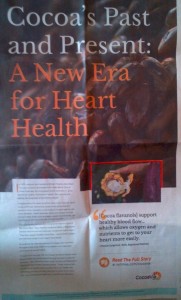Another 5 industry-funded nutrition studies with results favorable to the sponsor. The score: 75:6
I’ve managed to collect another five industry-sponsored studies with results that the funder must love, bringing the total to 75 since mid-March. As always, please keep your eye out for industry-funded studies that are contrary to the sponsor’s interests. I’ve only managed to find 6 so far.
Dairy products consumption and metabolic syndrome in adults: systematic review and meta-analysis of observational studies. Guo-Chong Chen, Ignatius M. Y. Szeto, Li-Hua Chen, Shu-Fen Han, Yan-Jie Li, Rina van Hekezen, and Li-Qiang Qin.. Science Reports. 2015; 5: 14606. Published online 2015 Sep 29. doi: 10.1038/srep14606
- Conclusions: Higher dairy consumption significantly reduced MetS [metabolic syndrome] by 17% in the cross-sectional/case-control studies…and by 14%…in cohort studies….Our findings suggest an inverse dose-response relationship between dairy consumption and risk of MetS.
- Funding: This study was supported by Yili Innovation Center, Inner Mongolia Yili Industrial Group Co., Ltd. The funding source had no role in the design or conduct of the study; collection, management, analysis, or interpretation of the data; or preparation, review, or approval of the manuscript.
- Comment: The Yili Group is a privately owned Chinese company headquartered in Hohhot, Inner Mongolia, engaged in processing and manufacturing milk products, including ice-cream, powdered milk, milk tea powder, sterilized milk and fresh milk.
Energy compensation following consumption of sugar‑reduced products: a randomized controlled trial. Oonagh Markey · Julia Le Jeune · Julie A. Lovegrove Eur J Nutr First online: 09 September 2015 DOI 10.1007/s00394-015-1028-5.
- Conclusion: Consumption of sugar-reduced products, as part of a blinded dietary exchange for an 8-week period, resulted in a significant reduction in sugar intake. Body weight did not change significantly, which we propose was due to energy compensation.
- Conflict of interest. This work was supported by Sugar Nutrition UK; however, the sponsor had no input into the study hypothesis and design, data analysis and interpretation.
- Comment: It is in the interest of sugar trade associations to demonstrate that eating less sugar has no effect on body weight.
Trends in Sugar-Sweetened Beverages: Are Public Health and the Market Aligned or in Conflict? William Shrapnel. Nutrients 2015, 7(9), 8189-8198; doi:10.3390/nu7095390.
- Conclusions: drinks containing non-nutritive sweeteners enable the “small change” in health behaviour that individuals are willing to consider…Among those who currently consume carbonated beverages, the “small change” involved in moving from a sugar-sweetened beverage to a similar sugar-free beverage appears to be one that some consumers are willing to accept. Facilitating this change may be a more productive public health strategy than advocacy for taxation of sugar-sweetened beverages.
- Author disclosure: William Shrapnel was paid a consultancy fee by the Australian Beverage Council Ltd. to prepare this paper…The authors declare no conflict of interest.
Dietary Intervention for Overweight and Obese Adults: Comparison of Low-Carbohydrate and Low-Fat Diets. A Meta-Analysis. Jonathan Sackner-Bernstein, David Kanter, Sanjay Kaul. PLoS One, October 20, 2015. DOI: 10.1371/journal.pone.0139817.
- Conclusions: In conclusion, this trial-level meta-analysis of 17 randomized controlled trials shows that both LoCHO and LoFAT diets are effective in reducing weight. However, LoCHO diet appears to achieve greater weight loss and reduction in predicted risk of ASCVD [atherosclerotic cardiovascular disease] events compared with LoFAT diet. On the basis of these results, we suggest that dietary recommendations for weight loss should be revisited to consider this additional evidence of the benefits of LoCHO diets.
- Funding: The study was supported by Atkins Nutritionals….Jonathan Sackner-Bernstein owns and may receive compensation from ExVivos, LLC. ExVivos, LLC provided payment to authors (DK and SK) for their role as contractors to ExVivos, LLC.
- Comment: ExVivos, LLC has one employee—Jonathan Sackner-Bernstein. Atkins Nutritionals markets a low-carbohydrate diet plan.
Breast-feeding and postpartum maternal weight trajectories. Laura Mullaney, Amy C O’Higgins, Shona Cawley, Rachel Kennedy, Daniel McCartney and Michael J Turner.
- Conclusions: There are many reasons why breast-feeding should be strongly promoted but we found no evidence to support postpartum weight management as an advantage of breast-feeding.
- Financial support: This project was supported by the UCD Centre for Human Reproduction and was partially funded by an unlimited educational grant from Danone Nutricia Early Life Nutrition for the first author.
- Comment: Food companies often provide scholarships for doctoral research. This particular arrangement raises some tough questions: Should dissertation research supervisors allow their students to accept such funding? Or does accepting such an award run the risk of compromising the integrity of the student’s work?



